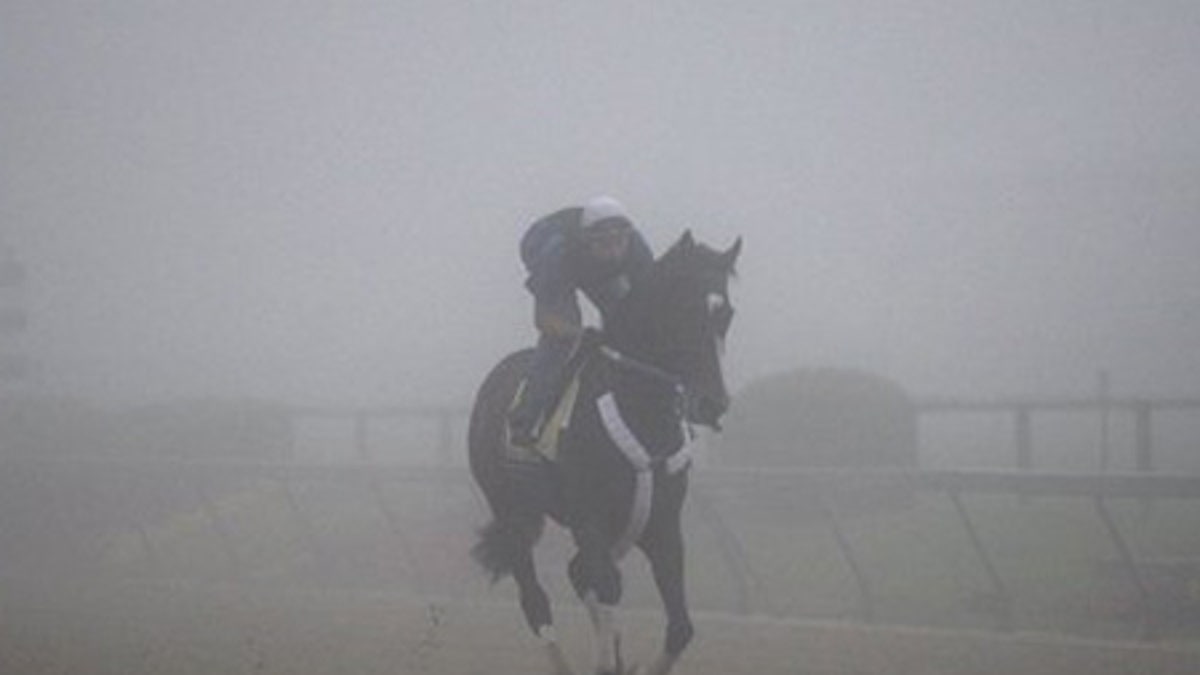
May 15: Exercise rider Dominic Terry takes Preakness entrant Rachel Alexandra around the track at Pimlico Race Course in Baltimore. (AP)
BALTIMORE – Even if Rachel Alexandra doesn't win the Preakness, the horse racing industry should be indebted to the filly and her owners for providing an aura of mystery and intrigue to the middle jewel of the Triple Crown.
Before Rachel Alexandra joined the fray, the 134th Preakness shaped up to be a ho-hum duel between the horse who won the Kentucky Derby as a 50-1 long shot and many of the colts he had already beaten.
Although Mine That Bird certainly deserved to win the Derby, he doesn't appear to be talented enough to become the first horse since Affirmed in 1978 to win the Triple Crown. Even if Rachel Alexandra wasn't in the field, Mine That Bird would not have been favored to win the Preakness.
Things began to get interesting after the filly was formally entered in the race. Suddenly, there was a legitimate favorite — a horse who had won five straight races by a combined 43 lengths.
"The filly gives us stability because she's such a talent," said Hall of Fame trainer D. Wayne Lukas, who has two horses running in the Preakness. "If the filly wasn't here it would be totally upside down, because we're still trying to validate the Derby winner."
And what about that filly? Can Rachel Alexandra outrun 12 strapping 3-year-old colts? A filly hasn't won the Preakness since 1924, so this race could make history.
There's also been an intriguing, unprecedented switcheroo. Jockey Calvin Borel left Mine That Bird to ride Rachel Alexandra, marking the first time a jockey surrendered a shot at the Triple Crown by switching from the Derby winner to a different horse in the Preakness.
On Friday, Borel further insulted Mine That Bird.
"He'd have to run the race of his life to beat my filly," Borel said. "I think all the other horses are going to have to run the race of their lives or me fall off or something stupid happen."
The switch means Mine That Bird's new jockey, Mike Smith, will climb aboard the Derby winner for the first time in the infield saddling area Saturday minutes before the Preakness post parade.
Now there's something that doesn't happen every third Saturday in May.
Much discussion has occurred this week over the choice of owner Jess Jackson to run Rachel Alexandra against bigger, stronger boys. Jackson was convinced there weren't any decent fillies left to challenge his 3-year-old, and figured it would do the sport some good to match a talented filly against some of the best colts in the business.
"I think the fans deserve to see the best horses compete, regardless of sex," Jackson said. "This isn't about male or female. It's about the best athletes. I hope this helps revive horse racing in the United States."
It sure didn't hurt. When Rachel Alexandra committed to the Preakness, she became the focal point of the media and the other trainers in the race. Many of the trainers — and the Pimlico oddsmaker — promptly labeled the filly as the horse to beat.
There have been philosophical questions, too, such as: When is the right time to match a filly against the boys?
"In order to run against colts — and I've done it a number of times, successfully and unsuccessfully — they have to dominate their own gender, and she does that," Lukas said. "They have to have tactical speed and a high cruising speed, and I think she will do that. Then you have to evaluate the pedigree, and she has the pedigree to get a mile and 3-16th, so she fits that parameter.
"Then you put the last one in there. Is she as good as the competition? Is there a Secretariat in there? A Seattle Slew? Spectacular Bid? No. You've got a 50-1 shot that won the Derby, you've got some other horses that didn't run to form. The scenario is perfect for her."
By Saturday night, the horse racing world will know if Lukas was right.
"There's going to be a lot of questions that are going to be answered," said Bob Baffert, trainer of Derby runner-up Pioneerof the Nile. "That's what the Preakness is about."
